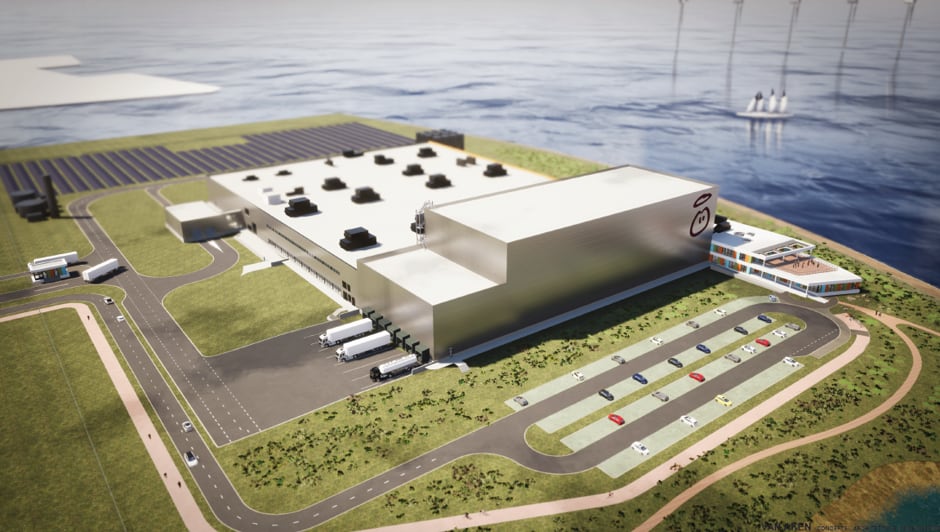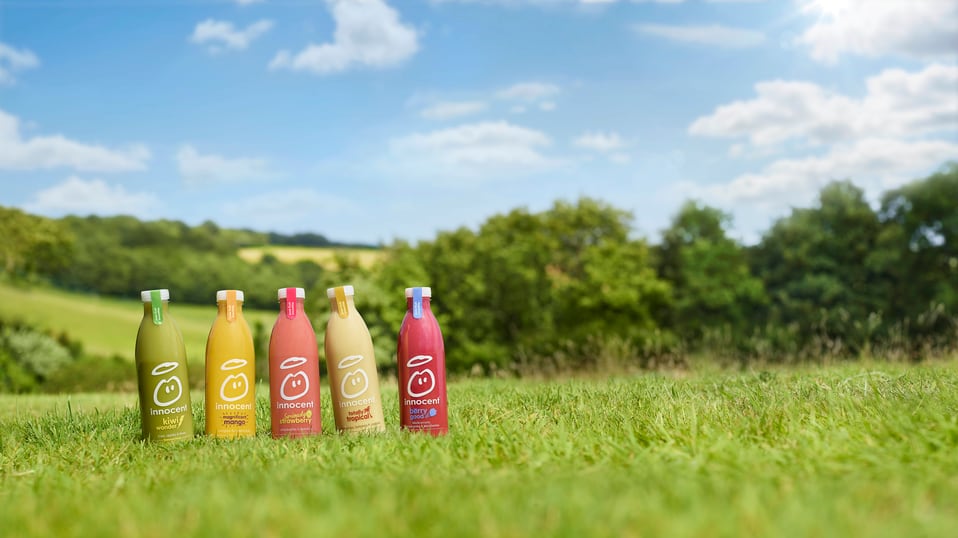Sustainability is at the centre of the new plant, starting with its choice of location - at a port where ingredients arrive - through to the carbon neutral technology at the facility itself.
The brand – founded by three friends in the UK in 1999 and bought by Coca-Cola in 2013 – has always championed sustainability as an integral part of its business, and says the blender helps it go further in realising its ambitions.
And it plans to share its learnings on building more sustainable production sites across the industry – even with its competitors.
Reducing food miles
The blender will serve 17 European countries: with distribution from the facility spreading from the Nordics down towards Italy. Once fully operational, it will produce some 400 million bottles a year.
Innocent will be the first company to establish itself at the Rotterdam Food Hub, a 60-hectare new business park on Calandkanaal that the Port of Rotterdam Authority is fitting out with optimal facilities for agrofood sector companies.
For instance, the Rotterdam Food Hub will have access to multiple berths especially for inland vessels and warehouses will be located immediately adjacent to the quays to enable refrigerated and frozen cargo to be stored, processed or transported quickly.
Innocent has always transported fruit by land or sea, rather than air freight, in order to choose a more sustainable option. Around half the fruit it uses comes from Europe, but tropical fruits like mango, pineapple and banana must come from further afield.
“We chose the Port of Rotterdam as the home of the blender as, for us, it was the most sustainable place to build it, and will mean we’re making our drinks as close as possible to where ingredients arrive in Europe and taking transport miles off the road,” Andy Joynson, chief blender at innocent drinks, told BeverageDaily. The company estimates this will save around 13,000 truck journeys from this measure alone.

Innocent pledges to always use the most efficient way to transport fruit – and thus the location in Rotterdam helps reduce the company’s food miles. And while that’s important to address, an innocent carbon audit showed that food miles contribute less than a third of the company’s overall footprint – and it's packaging and bottling that are the biggest areas to address.
Carbon neutral production
Innocent has previously relied on contract bottling. In creating its own bottling site, it’s going in big with a $250m facility optimized for sustainability.
“This is our first-ever, carbon-neutral, super-sustainable production site: and it’s safe to say we’re pretty excited,” said Joynson.
Wider initiatives
- The B-Corp wants its whole business to be carbon neutral by 2030.
- Its latest smoothie bottles use 50% rPET & 15% plant plastic from a by-product of sugar cane production
- Innocent suppliers must reach international sustainability standards
- 10% of profits go to the innocent foundation
“Throughout the past 20 years, our [bottling] partners have played a big role in helping us grow to become Europe’s favourite little healthy drinks brand. We came to a point in our journey where it now makes sense for us to build our own production site.
“Though we currently work with a fantastic group of partners across Europe, the building of the blender will succeed in bringing a large portion of our manufacturing network under one (pretty big) roof. It’s been designed in a way in which it can be adapted for increased demand.
“We always wanted to show the world that you can build a successful business that cares about more than just profit, and that you can use a business as a force for good.
"The blender will be a symbol of our efforts to turn this vision into reality. It’s a key milestone to achieve our ambition of proving that balancing people, the planet and profit works.”
'When we began on this journey, we didn't have all the answers'
In making the blender carbon neutral, innocent has focused on three key areas: reducing overall energy consumption; re-using heat energy; and sourcing renewable energy.
“Firstly, we’ve worked hard to look at how we will reduce energy demand, by looking at the expected energy consumption of the site,” said Joynson. “We are also focussed on developing more efficient systems, for example the blender will be re-using waste heat, which will reduce energy consumption for heating and cooling.
“We are also maximising the on-site opportunities for renewables through a combination of wind and solar power, as well as working locally to procure additional renewable energy.”
Despite the disruption from COVID-19, innocent remains on schedule to produce the blender’s first bottle in 2021. The facility has been some four years in the planning: and Joynson points out that a lot of the process for bringing the blender from conception to reality has been about learning and exploring new ideas.
“As we began on this journey, we didn’t have all the answers and we continue to learn and implement new ideas and technologies," he said.
"We’ve done this by working closely with experts in this space, and have been open to change design as we learn more. What is important to us is for the blender to inspire a wider change in the world of the FMCG supply chain, and show how we think a production site should be and indeed what’s possible.
"We hope to share our sustainability learnings with everyone – even competitors - to encourage more companies around the world to make the move to more sustainable production sites.”
Working with partners
Bottling lines
Krones will provide four complete PET bottling lines: with each line handling up to 32,000 containers an hour. The Contipure AseptBloc DA blow-moulder/filler block consists of a Contiform 3 Pro stretch blow-moulding machine and a Modulfill Asept aseptic filler. For the Contipure D preform sterilisation module, innocent chose a version with lower consumption of hydrogen peroxide, steam and energy, plus shorter preparation times. All containers after being filled are fitted with a tamper-evident seal and – depending on the format involved – dressed in a wrap-around or pressure-sensitive label. The modularised Topmodul labeller is block-synchronised directly with the Variopac Pro FS packer.
Monitoring power usage from Fruit Towers in London
Cloud, cybersecurity and computing company Atos will provide an end-to-end technology solution for the blender. It will help create a digital factory with a suite of state-of-the-art solutions, including active LAN and WIFI networking.
The cloud-based solution enables WIFI network management both on site at the blender in Rotterdam as well as remotely from innocent’s London headquarters, Fruit Towers. Scalable compute and storage technologies will deliver in-depth data gathering and analytics on power usage, helping innocent to monitor and adjust the factory’s energy consumption and drive resource efficiency to support its decarbonization objectives.


